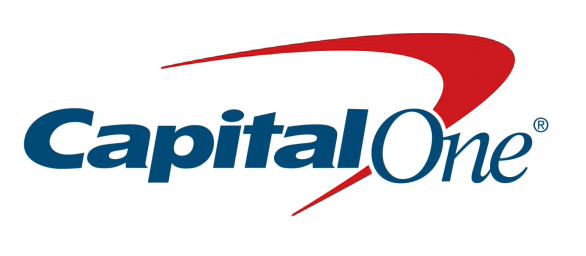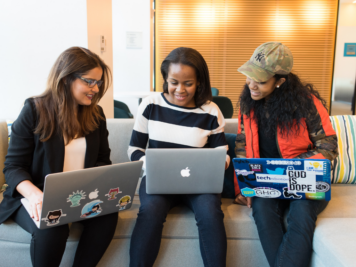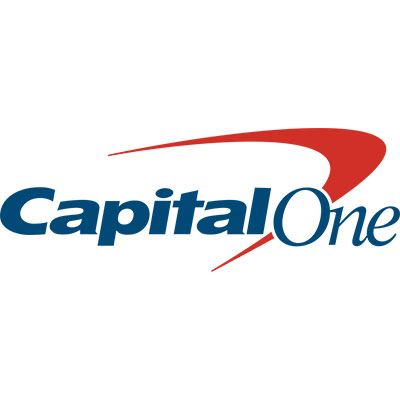What if we told you there was a company where you could work with the latest technologies and some of the brightest minds in the industry, all while receiving on-demand professional development training to hone and grow your skills?
If this sounds right up your alley, then it’s time to take a closer look at Capital One. The company prides itself on being the place for recent grads to start their careers, and once you hear about the experiences of a few newly hired recent grads, we think you’ll see why.
Five of Capital One’s recent grad associates gave us the lowdown on the company culture, why they chose Capital One and what advice they have for students:
Q: What drew you to working at Capital One?
A: Jibby, Associate Software Engineer (Carnegie Mellon ‘16): The two things that drew me to Capital One were the culture and the Technology Development Program (TDP). Being an intern at Capital One last summer, I could see that everyone was respected no matter how new you were to the company, and that was the atmosphere I wanted to be in. As part of the culture, the company really ensures great work-life balance and we have great work hours. I always feel encouraged to take advantage of out of office activities and even chances to travel to other colleges to help out with recruiting! As for the TDP, I don’t know all of the cool new technologies out there, but with this rotational program, I have the opportunity to follow where my curiosity is leading me. This program allows me to be with a team for one year learning a whole stack of technologies, and then rotate to a completely different team with different technologies the next year to increase my learning opportunities.
A: Linett, Associate Auditor (North Carolina State University ‘14): The top reasons why I chose Capital One to start my career:
- The people: From recruiters, to my current team, everyone is just truly awesome.
- The flexibility: Capital One fosters a very flexible environment that helps their associates achieve the work life balance they want.
Q: What is your biggest learning from your first year at Capital One?
A: Linett: Don’t be afraid to “own” your career; ask for opportunities! People are always willing to expose you to more and it’s a great way to showcase your talents, take on a new leadership role, or enhance a certain skill.
A: Preet, UX Designer (University of Texas-Dallas): When I was still in college, I didn’t understand how people of different disciplines would communicate and work together to deliver a product or experience. Learning about it through Google searches wasn’t enough to understand the ins and outs of it. Now I get it. I get how business works and how my role as a designer fits into it. It’s really something to see different people from technology, product, design, legal, and more all come together and participate in the art of creation. Learning to communicate with people from different backgrounds and with different roles is one of the most valuable learning experiences I’ve had. Having this more holistic view of business is not only helping me understand Capital One and design better, but it’s also helping me understand the world better.
Q: What advice do you have for students applying Capital One?
A: Jibby: My advice to students applying to Capital One would be to study for the interview! For me, it went really smoothly because I had already been through tons of technology and behavioral interviews so I had a lot of practice. [Use your school’s] practice interviews or just have a friend ask you questions so you can practice talking about yourself and problem solving with an audience.. Another tip would be to connect with current associates and ask them about their experiences; it really helps to get all of your informal questions answered.
A: Mamadou, Software Engineer (Dickinson College ‘16): I would recommend keeping an open mind, being curious, driven, and willing to learn fast. The tech industry is evolving at a very fast pace, and we have to continuously learn and innovate in order to stay up to date. Bring your creativity and problem-solving skills into play.
A: Preet: Do you. I mean, still be appropriate and all that, but don’t compromise yourself to get the job. Channel your passion, find a way to harmonize it with your personality, and let that guide you. If you’re thinking of applying, that means that there’s something in you that cares about design (or whatever field you’re looking to apply in). Extract it out of yourself, learn to be confident in who you are, and soar. If you realize you aren’t actually interested, that’s okay. There’s something out there for everybody. Do a little more soul-searching. You’ve got time.
Q: How did you know you were performing well during your first year? How does Capital One track and measure success in this role?
A: Jibby: Capital One has end-of-year and mid-year reviews, where each associate meets with their manager to formally discuss how they have been performing against their goals. I also have bi-weekly meetings with my manager to touch base informally and check in about my performance and ways I can improve.
A: Mary Kate, Human Resources Rotation Associate (University of Virginia ‘16): In my case, you can get a good pulse on how you’re performing based on how your clients respond to your work, and if you get pulled into new work. I can tell I’m performing well due to the fact that my scope has expanded and I get to work with an increasing number of people on a variety of different projects, which I’ve really enjoyed. Capital One has fantastic performance management; I just went through my first performance cycle, and my manager solicited feedback from every single person I worked with and had an open conversation with me about it, in addition to a follow-up. It’s always helpful to know what you can improve on, and managers help you think through your development goals twice a year.
Q: Tell us about any professional development training you received during your first year.
A: Mamadou: Capital One University is our go-to platform for learning and training. Since joining Capital One, I have taken multiple courses to help accelerate my learning and broaden my knowledge base. Additionally, as part of the Technology Development Program, I attended a full week training on software craftsmanship. The training taught me about best coding practices and tools that I can leverage to advance my professional development. Currently, one of Capital One’s central technology strategies is to build our applications in the cloud. In order to help advance this goal, I have taken courses to learn about AWS and its cloud services. I recently became an AWS Solution Architect Certified and I am working on getting my AWS Developer Certification.
A: Preet: I’ve traveled a lot more than I expected to for design training. Within my first month working here, I was flown to San Francisco to attend a user experience workshop. I learned a lot about different facets of design and made new friends from different parts of the country… It was a whole lot of professional and personal growth in a very short amount of time. I’m looking forward to the next few conferences I’m signed up for, where I’ll be learning things like Designing for Voice, Putting Humanity into Chatbots, and more. I’m kind of geeking out just thinking about it.
Q: What’s something surprising about working at Capital One that most people wouldn’t know?
A: Jibby: Technology is at the forefront of the company’s goals, which honestly surprised me, because it was “just a bank” to me before joining the company. But the technology culture at Capital One is just what I would expect to see at a technology company. It’s exciting to know that I joined a company that prioritizes being a leader in the technology field, which has opened so many doors for learning new technologies.
Q: What makes Capital One an incredible place to work?
A: Mamadou: I would have to say the work culture and the opportunities to give back to our community. The collaborative work environment at Capital One allows you to contribute and learn from one another. I have learned so much from my co-workers and have built great relationships with them. Additionally, I get to volunteer through work and am encouraged to give back to our local communities, which really makes a differences in peoples’ everyday lives. .
A: Mary Kate: One of the things that makes Capital One an incredible place to work is the learning culture. All associates are encouraged to learn more about anything that piques their interest or might assist them in a future role. What makes learning here special is that everyone views themselves as both students and teachers. In my first few months, I helped teach an analytics training to some HR associates much older than me. There was no stigma because I’m fresh out of school; people recognize I may have studied these topics more recently and have some new ideas to bring to the table.
Sound like the right place for you? Head on over to WayUp to learn more how you can launch your career at Capital One.
More from Capital One:
The Unexpected Way One Recent Grad Found Her Way to Capital One






